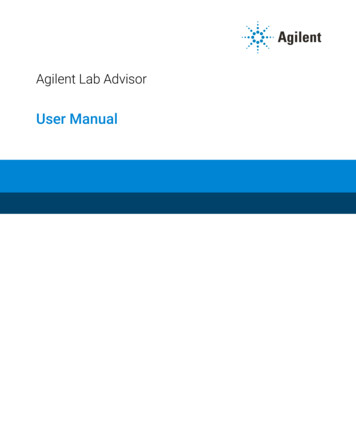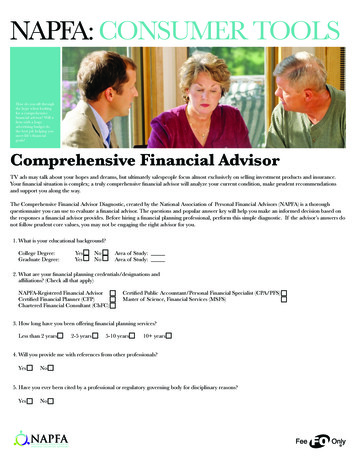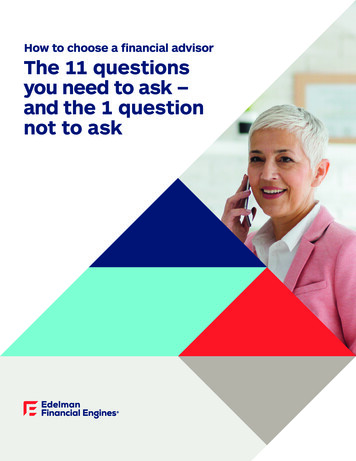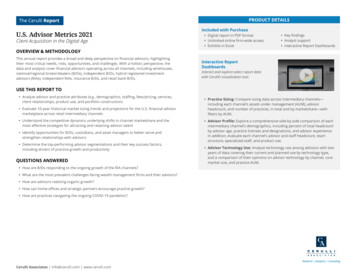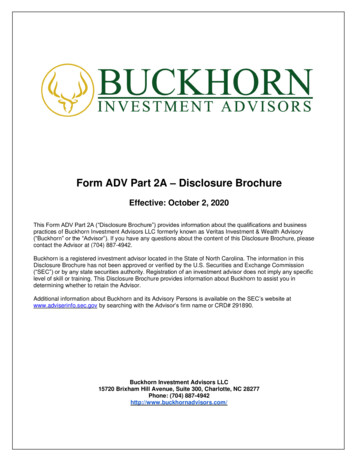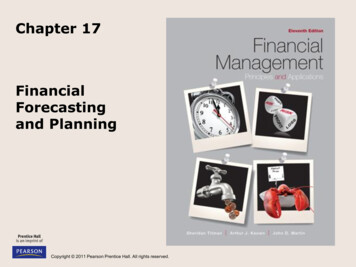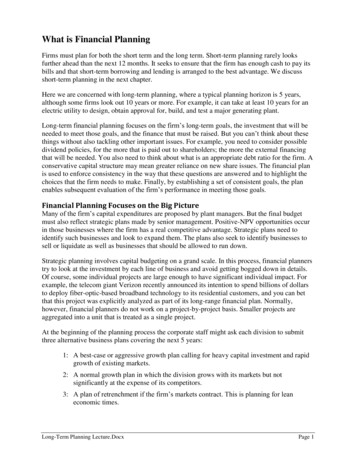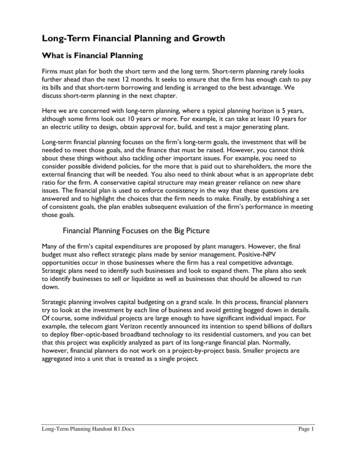
Transcription
FINANCIAL PLANNINGWHICH PERSONA YOUARE AND WHY IT MATTERSIN ASSOCIATION WITH:
CONTENTSINTRODUCTION.3THE THREE PERSONAS OF FINANCIAL LITERACY .5WHY DO PERSONAS MATTER?.9FOUR STEPS TO IMPROVING FINANCIAL LITERACY.9BECOMING AN EDUCATED INVESTOR WILL IMPROVE SATISFACTION WITH YOUR ADVISOR .19METHODOLOGY .19ACKNOWLEDGMENTS .202 FINANCIAL PLANNING: WHICH PERSONA YOU ARE AND WHY IT MATTERS
IntroductionFinding the right financial advisor is an important decision—one that can make a realdifference in your long-term financial well-being. However, with so many different typesof advisors offering different services at different rates, it can be difficult to figure out thebest path forward. But you’re not alone. A recent Forbes Insights survey found that 78%of investors do not understand the distinctions among types of financial advisors—such as independent registered investment advisors, financial planners, registeredrepresentatives and money managers—to name a few. Additionally, more than a thirdof investors don’t know if their advisor is a fiduciary—someone who is legally requiredto act in their clients’ best interests at all times—and 29% are unclear about how theiradvisors charge for services.This lack of knowledge is unsettling, especially since our survey also found that investorswho are the most financially literate are also the most satisfied with their advisor. Sowhat can you do to become better informed and get the most from this importantrelationship? Forbes Insights surveyed more than 300 individual investors to find out.After reviewing the data, we identified three unique personas of financial literacy—Novices, Apprentices and Experts—and then analyzed their differences to identify foursteps you can take to make a difference:3 FINANCIAL PLANNING: WHICH PERSONA YOU ARE AND WHY IT MATTERS
1Understand and outline your goals Combine recommendations from family and friends with yourown due diligence when selecting an advisor23 onfirm fee structures with your advisor up front and ensure youCunderstand exactly how they’re being paid4Engage with your advisor oftenThis report details these four steps and provides key findings from the Forbes Insightsresearch. Before jumping in though, it’s important to first determine where you fall onthe financial literacy spectrum.Are you a novice, apprentice or an expert? Keep reading to find out.COPYRIGHT 2021 FORBES INSIGHTS 4
The Three PersonasOf Financial LiteracyInvestors are, of course, not all alike. Not only do people have varying assetlevels and degrees of complexity in their financial lives, they also havedifferent life goals and priorities. After surveying more than 300 individualinvestors, we identified three distinct investor personas.NoviceNovices make up 18% of the sample. These investors are unsure whatfees they are paying when using an advisor, don’t know if their advisoris a fiduciary or not, and have a limited understanding of the differencesamong types of advisors.5 FINANCIAL PLANNING: WHICH PERSONA YOU ARE AND WHY IT MATTERS
ApprenticeApprentices make up 50% of the sample. These investors fall somewherein the middle on industry knowledge. They are unsure of the differencesamong types of advisors, but are clear on what they’re being charged andif their advisor is or isn’t a fiduciary.ExpertExperts are 32% of the sample. These investors are able to correctlyidentify the different types and affiliations of financial advisors, know whatthey’re being charged for and know if their advisor is a fiduciary. They areat the top of their game in terms of financial knowledge.Which of these personas best describes you?Take our short quiz to find out.COPYRIGHT 2021 FORBES INSIGHTS 6
Quiz: Which Persona Are You?Given the complexity of investing, financial literacy is important. As the ForbesInsights research indicates, a majority of investors lack an understanding of theindustry and the different types of advisors available to them. Even more critically,less informed investors tend to be less satisfied with their advisor, meaningtransparency and understanding, not just returns, drive satisfaction.All investors can benefit from better information about changing industryterminology, affiliation models and compensation practices, but knowing whereyou stand on the financial literacy spectrum can help you determine whichquestions you need to be asking of yourself and your advisor. Not sure where youstand? Take our short quiz to find out.QUESTION 1: On a scale from 1 to 5, where 1 is “not well at all” and 5 is “verywell,” how well do you know the difference between a registered representative,financial planner, financial advisor and money manager?12345QUESTION 2: What is your level of understanding of what you are being charged? I receive a full accounting at every billing and understand the charges It’s not always clear to me what I’m payingQUESTION 3: Is your financial advisor a fiduciary (i.e., someone who is legallybound to look out for your financial interests)?Yes6 FINANCIAL PLANNING: WHICH PERSONA YOU ARE AND WHY IT MATTERSNoNot sure
Key: Award yourself the following points for each response:Q1: 1 2; 2 2; 3 5; 4 8; 5 8Q2: Full accounting 4; Not clear 2Q3: Yes 3; No 3; Not sure 1Below 10—You’re a NoviceYou’re still in the early stages of navigating through the complexity of the financial planningindustry. Start by visiting the “Learning Hub” on FindYourIndependentAdvisor.com to learnthe differences among the types of advisors and how to connect with one near you.10—15—You’re an ApprenticeYou have a reasonable grasp on the financial planning industry and what your advisor offers,but there’s still room to learn. If you’re considering switching advisors, check out “Choosingan Advisor” on FindYourIndependentAdvisor.com to understand what questions you needto ask yourself in order to make the best choice.Above 15—You’re an ExpertYou have a strong understanding of the financial planning industry as well as your advisor’sdesignation. As the industry continues to change though, there’s no reason to stop learningand educating yourself. Consider browsing the Investing channel on Forbes.com or reading2016 Wealth Management Trends, a recent report by PwC that highlights how the industryis changing and what trends are reshaping the advisor-investor relationship.COPYRIGHT 2017 FORBES INSIGHTS 7
Why Do Personas Matter?By classifying investors into these personas, we can get a clearer picture ofthe factors that contribute to a successful advisor relationship. Perhaps notsurprisingly, it turns out that it pays to be an informed consumer—the moreyou know about how your financial advisor works, the more likely you are to besatisfied with the results.Figure 1. How Satisfied Are You With Your Advisor?Novice23%ApprenticeExpert65%52%65%Very SatisfiedFour Steps To ImprovingFinancial LiteracyNo matter which persona you fall into, there are four steps you can take to becomea more knowledgeable investor and improve your satisfaction with your advisor.9 FINANCIAL PLANNING: WHICH PERSONA YOU ARE AND WHY IT MATTERS
STEP 1Understand and Outline Your GoalsFirst, spend some time thinking about your life goalsand priorities. Then, with those in mind, begin to outline your financial goals. “With prospective clients, wego through a process and ask a series of questions,starting with, ‘What’s important to you?’” says GregorySullivan, founder, president and managing director ofSullivan, Bruyette, Speros & Blayney. “We have a frankand open discussion about their needs and determinehow we can best meet their objectives.”Novices, who have the least assets of all threegroups, are disproportionately focused on retirement (71%). They may be best served by an advisorwith deep experience helping investors with similar asset levels plan for a comfortable retirement.Apprentices, who tend to have slightly higher assetlevels, may be more likely to benefit from an advisor who can address retirement planning, as wellas a broader range of financial concerns includingmoney management and estate planning. Experts,who are comparatively wealthy, may need an advisorwith deep expertise around issues like minimizingtax exposure and charitable giving. Having a clearsense of your personal goals can help you evaluatewhether an advisor is a good fit for you (Fig. 2)Figure 2. Aspects of Your Financial Situation That You Need the Most Help With71%Saving For Retirement19%NoviceMinimizing Tax ExposureMoney Management13%Estate Planning16%Managing Wealth Transfer13%Saving For CollegeInsurance6%10%Charitable Giving 0%Buying or Selling A Business 0%Family Office Services 0%COPYRIGHT 2021 FORBES INSIGHTS 10
Saving For Retirement54%32%Minimizing Tax Exposure31%ApprenticeMoney Management21%Estate Planning14%Managing Wealth TransferSaving For College 5%Insurance 3%Charitable Giving2%Buying or Selling A Business1%Family Office Services1%53%Saving For Retirement38%Minimizing Tax Exposure24%Money Management40%ExpertEstate Planning15%Managing Wealth TransferSaving For College 5%InsuranceCharitable Giving11%7%Buying or Selling A Business 4%Family Office Services2%11 FINANCIAL PLANNING: WHICH PERSONA YOU ARE AND WHY IT MATTERS
THE TAKEAWAY: Regardless of what your goals are, identify where youneed the most help. By having a sense of your priorities, you can seekadvisors with the specific expertise and services that you need and directyour advisor’s attention to what matters most, thus increasing the likelihood of a successful relationship and satisfaction with the outcomes.STEP 2Combine Recommendations From Family and Friends WithYour Own Due Diligence When Selecting an AdvisorWhen it comes to choosing an advisor, Novices, Apprentices and Experts all agree on what’s important—honesty, integrity and reasonable fees. However, the personas differ sharply in the process theyfollow to find an advisor. Novices tend to rely on recommendations from family and friends. WhileApprentices and Experts also get recommendations from their family and friends, they are more likelyto conduct their own research and tap into their existing relationships with other professionals (suchas CPAs, attorneys, etc.) to help identify advisors who might meet their needs (Fig. 3).Figure 3. The Best Way to Find an ticeExpertPre-existing Relationship3%20%22%Research on My Own65%NoviceApprentice39%Expert38%Recommendations fromFriends or FamilyCOPYRIGHT 2021 FORBES INSIGHTS 12
These differences between the personas also carry over to the process they follow to vet potential advisors.Here, Novices continue to rely mainly on input from family and friends, while Experts do their own due diligence,conducting more online research and interviewing several advisors before making a decision (Fig. 4).Figure 4. Process for Vetting an Advisor58%Relying On Advice From Family or FriendsAligning on How Often &How We Would CommunicateNoviceInterviewing Serveral Advisors26%10%Conducting Online Research16%Asking About The Client He/She Has16%Speaking To Some Of The Clients16%19%Meeting Other People In The OfficeChecking with Regulators13 FINANCIAL PLANNING: WHICH PERSONA YOU ARE AND WHY IT MATTERS3%
37%Relying On Advice From Family or FriendsApprenticeAligning on How Often &How We Would Communicate44%Interviewing Serveral Advisors28%Conducting Online Research25%23%Asking About The Client He/She Has28%Speaking To Some Of The ClientsMeeting Other People In The Office11%Checking with Regulators10%Relying On Advice From Family or Friends47%Aligning on How Often &How We Would Communicate36%40%ExpertInterviewing Serveral AdvisorsConducting Online Research33%Asking About The Client He/She Has31%Speaking To Some Of The ClientsMeeting Other People In The OfficeChecking with Regulators16%25%15%COPYRIGHT 2021 FORBES INSIGHTS 14
THE TAKEAWAY: When selecting or vetting an advisor, do not rely on onlyone source. Seek out personal recommendations from family and friends,but also do your own due diligence to make sure the advisor is a good fitfor your individual needs. Research different firms to learn about theirofferings and rates, as well as their investing philosophy, which can differgreatly from firm to firm. The more time you invest up front to finding anadvisor suited to your specific needs, the more satisfied you’ll be with therelationship in the long run.STEP 3 Confirm Fee Structures With Your Advisor Up Front andEnsure You Understand Exactly How They’re Being PaidThere are a number of ways advisors earn money for their services. Some advisors operate on a “fee-only”model, and are paid a flat fee or a fee based on their clients’ portfolio size. Some receive commissions forrecommending specific investment products. Others earn a mix of fees and commissions. As an investor, it’scritical to know both what you are paying your advisor and what, if any, compensation they are receiving fromother sources. One hundred percent of Novices are unclear on what they’re paying for when using an advisor,which is in sharp contrast to Experts, 100% of whom are clear on what their advisors are charging. In addition,almost half (42%) of Novices do not know the fee structures of their advisors (Fig. 5).Figure 5. How Does Your Financial Advisor Charge for Services?15 FINANCIAL PLANNING: WHICH PERSONA YOU ARE AND WHY IT MATTERS
THE TAKEAWAY: Make sure you understand how, and by whom, your advisor gets paid. “How you are compensated is one question clients don’talways ask, but it’s one of the most important,” says Damon White, chiefoperating officer and co-founder of Evermay Wealth Management, LLC. “Tocreate a successful advisor relationship, and one that's built on trust, therehas to be transparency and a mutual understanding of the fee structure.”By clarifying up front how your advisor earns money, you can prevent confusion down the road.COPYRIGHT 2021 FORBES INSIGHTS 16
STEP 4 Engage With Your Advisor OftenWorking closely with your advisor will improve your satisfaction with the relationship. Highlyfinancially literate investors engage much more frequently with their advisor than other groupsdo. Experts communicate with their advisor once every month, while Apprentices and Novices doso much less often (Fig. 6).Figure 6. How Often Do You Engage With Your Financial Advisor?17 FINANCIAL PLANNING: WHICH PERSONA YOU ARE AND WHY IT MATTERS
THE TAKEAWAY: To improve your relationship with your advisor,outline how you will communicate up front. Opt to engage morefrequently, whether it be over the phone or in person, to ensureyou’re both in alignment. Seek out an advisor who is open andtransparent about his or her approach, and who takes the time toaddress your questions and concerns.COPYRIGHT 2021 FORBES INSIGHTS 18
Becoming An Educated InvestorWill Improve Satisfaction WithYour AdvisorNo matter where you fall on the persona spectrum—Novice, Apprentice orExpert—following these four steps can help you become a more educated investorand get the most from your relationship with your financial advisor.The key thing to remember: by asking questions and being engaged, you aremore likely to find an advisor who is aligned with your needs and motivated tohelp you meet your goals. “As an advisor, it is our role to help clients understandthe market and the opportunities available to them,” says Roger Scheffel, portfoliomanager at Wilbanks, Smith & Thomas. “But more importantly, we’re there to doeverything in our power to help them achieve financial success.”MethodologyBased on a 2016 survey of 328 U.S.-based individual investors, including highnet worth individuals, conducted by Forbes Insights in partnership with CharlesSchwab. A portion of respondents (173) were segmented into the three personas(Novice, Apprentice and Expert) based on how well they understood thedifferences among types of advisors, what they were being charged when usingan advisor and whether they could identify their advisory as a fiduciary.19 FINANCIAL PLANNING: WHICH PERSONA YOU ARE AND WHY IT MATTERS
AcknowledgmentsForbes Insights and Charles Schwab would like to thank the following individualsfor their time and expertise: Roger Scheffel, Portfolio Manager, Wilbanks, Smith & Thomas Gregory Sullivan, Founder, President and Managing Director, Sullivan, Bruyette,Speros & Blayney Damon White, Chief Operating Officer and Co-Founder, Evermay Wealth Management, LLCDisclosureThe Charles Schwab Corporation provides a full range of securities, brokerage,money management and financial advisory services through its operating subsidiaries. Its broker-dealer subsidiary, Charles Schwab & Co., Inc. (Schwab), member SIPC,offers investment services and products, including Schwab brokerage accounts. TheCharles Schwab Corporation and its subsidiaries are not affiliated with Forbes.The firms listed above custody all or some of their assets with Schwab. The firmsare not owned by or affiliated with Schwab and its personnel are not employees oragents of Schwab. This is not a referral to, endorsement or recommendation of, ortestimonial for the advisor with respect to its investment advisory or other services.COPYRIGHT 2021 FORBES INSIGHTS 20
ABOUTFORBES INSIGHTSForbes Insights is the strategic research and thought leadership practice of Forbes Media, a globalmedia, branding and technology company whose combined platforms reach nearly 75 millionbusiness decision makers worldwide on a monthly basis. By leveraging proprietary databases ofsenior-level executives in the Forbes community, Forbes Insights conducts research on a widerange of topics to position brands as thought leaders and drive stakeholder engagement. Researchfindings are delivered through a variety of digital, print and live executions, and amplified acrossForbes’ social and media platforms.FORBES INSIGHTSSALESBruce Rogers, Chief Insights OfficerErika Maguire, Director of ProgramsAndrea Nishi, Project ManagerNorth AmericaBrian McLeod, Commercial Directorbmcleod@forbes.comMatthew Muszala, ManagerWilliam Thompson, ManagerEDITORIALKasia Wandycz Moreno, DirectorHugo S. Moreno, DirectorDavid Adler, Report AuthorZehava Pasternak, DesignerEMEATibor Fuchsel, ManagerAPACSerene Lee, Executive DirectorRESEARCHRoss Gagnon, DirectorKimberly Kurata, Senior AnalystSara Chin, Research Analyst499 Washington Blvd., Jersey City, NJ 07310 212.366.8890 www.forbes.com/forbesinsights
Apprentice Apprentice Apprentice Expert Expert Expert 32% 3% 41% 20% 39% 40% 38% Pre-existing Relationship Research on My Own Recommendations from Friends or Family Figure 3. The Best Way to Find an Advisor 65% 22% Combine Recommendations From Family and Friends With Your Own Due Diligence When Selecting an Advisor STEP 2

